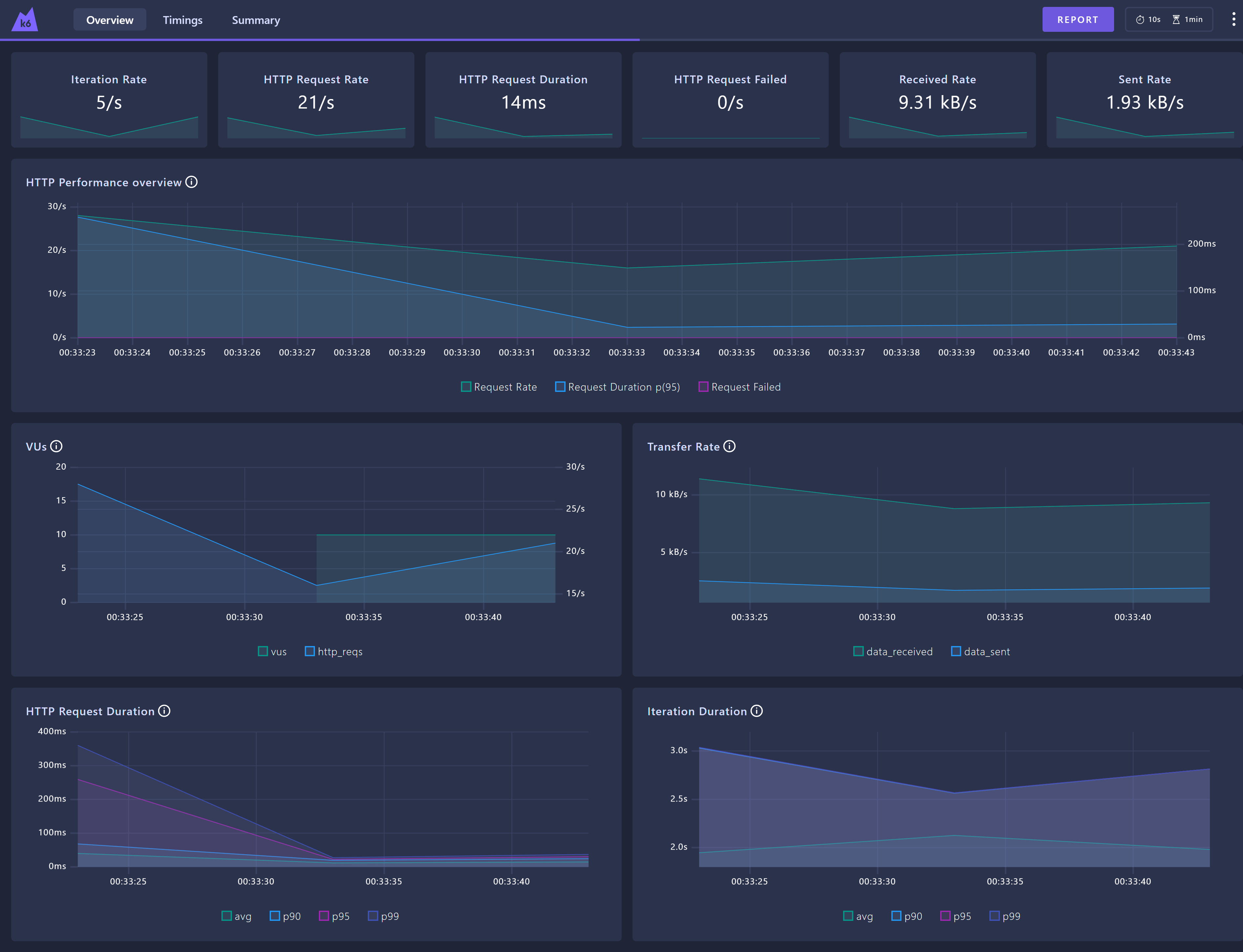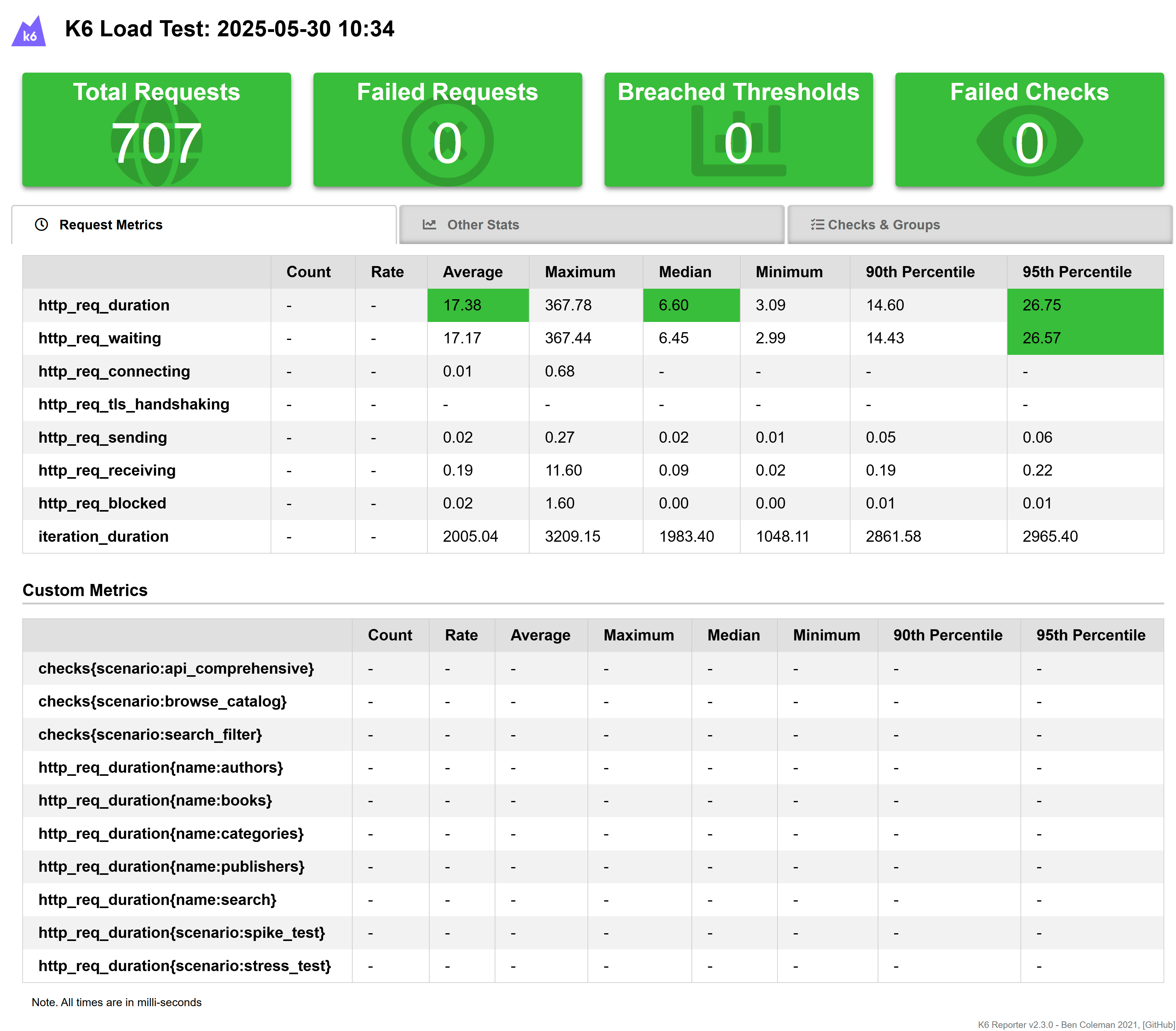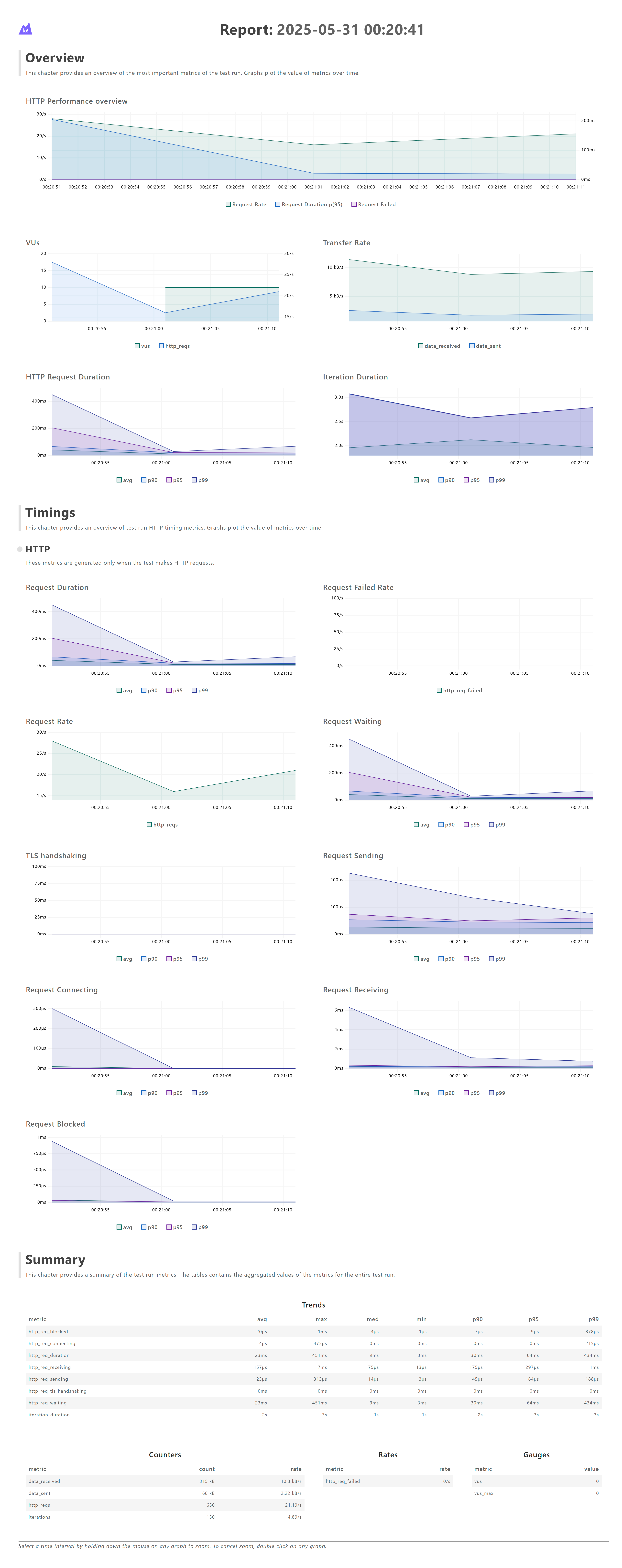BookWorm K6 Test Suite
This repository features a robust, maintainable K6 performance testing suite for the BookWorm application, built with modern TypeScript. The suite replaces the legacy single-file JavaScript approach with a modular, scalable project structure—making it easier to extend, debug, and ensure code quality for ongoing performance testing.
What is K6?
K6 is a modern load testing tool designed for developers and DevOps teams. It uses JavaScript (and TypeScript) to define test scenarios, making it accessible to development teams while providing enterprise-grade performance testing capabilities. Unlike traditional testing tools, K6 is designed with developer experience in mind, offering:
- Developer-centric: Write tests in JavaScript/TypeScript
- CI/CD friendly: Easy integration with modern development workflows
- Cloud-native: Built for microservices and distributed systems
- Performance-focused: Efficiently handles high loads with minimal resource usage
Why Performance Testing for BookWorm?
As an e-commerce bookstore application, BookWorm serves multiple user types simultaneously—customers browsing catalogs, searching for books, managing their baskets, and completing orders. Performance degradation can directly impact:
- User Experience: Slow page loads lead to abandoned sessions
- Business Revenue: Poor performance affects conversion rates
- System Reliability: Understanding load limits prevents outages
- Scalability Planning: Data-driven decisions for infrastructure scaling
Our K6 suite ensures BookWorm maintains excellent performance under various load conditions, from normal browsing to peak shopping periods.
🏗️ Project Structure
k6/
├── src/
│ ├── main.ts # Main entry point
│ ├── types/
│ │ ├── external-libs.d.ts # Type declarations for external libraries
│ │ └── index.ts # TypeScript interface definitions
│ ├── utils/
│ │ ├── seeded-random.ts # Secure pseudorandom number generator
│ │ ├── test-data.ts # Test data generators
│ │ ├── validation.ts # Response validation utilities
│ │ └── helpers.ts # Helper functions
│ ├── scenarios/
│ │ ├── browse-catalog.ts # Browse catalog scenario
│ │ ├── search-filter.ts # Search & filter scenario
│ │ ├── api-comprehensive.ts # Comprehensive API testing
│ │ ├── stress-test.ts # Stress testing scenario
│ │ └── spike-test.ts # Spike testing scenario
│ └── config/
│ └── index.ts # K6 options and constants
├── dist/
│ ├── main.js # Compiled output (generated)
│ ├── main.js.map # Source map (generated)
│ ├── summary.json # Custom summary statistics (generated)
│ ├── summary.html # HTML report (generated)
│ └── dashboard-report.html # Dashboard report (generated)
├── package.json # Dependencies and scripts
├── tsconfig.json # TypeScript configuration
├── .prettierrc.json # Prettier configuration
├── .prettierignore # Files to ignore for Prettier
└── webpack.config.js # Webpack bundling configuration
💡 Repository Location: The complete K6 testing suite is available at BookWorm/src/Aspire/BookWorm.AppHost/Container/k6
🚀 Getting Started
Prerequisites
Before running the K6 performance tests, ensure you have:
- Node.js 18+: Required for TypeScript compilation and package management
- Docker: For running BookWorm application locally
- BookWorm Application: Running locally or accessible test environment
📊 Test Scenarios
1. Browse Catalog 📚
- Purpose: Simulates realistic user browsing patterns in the bookstore
- Load: Light load (3-5 VUs for development, 20-50 VUs for staging)
- Duration: 2 minutes
- Behavior: Book listings, category navigation, author pages, pagination
- Key Metrics: Page load times, catalog response rates, memory usage
2. Search & Filter 🔍
- Purpose: Tests search functionality and filtering under load
- Load: Medium load (5-8 VUs for development, 30-60 VUs for staging)
- Duration: 2 minutes
- Behavior: Search queries, price/genre filters, sorting options, pagination
- Key Metrics: Search response times, filter accuracy, database performance
3. API Comprehensive 🔗
- Purpose: Systematic validation of all API endpoints and their performance
- Load: Medium load (3-6 VUs for development, 25-50 VUs for staging)
- Duration: 1.5 minutes
- Behavior: All REST endpoints, parameter combinations, edge cases, error handling
- Key Metrics: API response times, error rates, throughput, data consistency
4. Stress Test 💪
- Purpose: High-intensity testing to identify breaking points
- Load: High load (10-15 VUs for development, 100-200 VUs for staging)
- Duration: 2 minutes
- Behavior: Concurrent requests, complex operations, resource-intensive queries
- Key Metrics: System stability, resource utilization, failure thresholds
5. Spike Test 📈
- Purpose: Tests system resilience during sudden traffic surges
- Load: Sudden spike (2 → 12 → 2 VUs for development, 10 → 100 → 10 VUs for staging)
- Duration: 1.5 minutes
- Behavior: Rapid traffic changes, consecutive requests, recovery patterns
- Key Metrics: Auto-scaling response, recovery time, service degradation
📊 Dashboard Integration
The K6 tests integrate seamlessly with the K6 Dashboard for real-time monitoring and comprehensive analysis. The dashboard provides:
Features
- Real-time Metrics: Live visualization of test execution
- Historical Trends: Track performance changes over time
- Alert Configuration: Set thresholds for automatic notifications
- Team Collaboration: Share results and insights across teams
Setup
# Install K6 with dashboard support
k6 run --out dashboard dist/main.js
# Or use the web dashboard
k6 run --out web-dashboard=port=3000 dist/main.js
Benefits
- Visual Analysis: Charts and graphs for better understanding
- Bottleneck Identification: Quickly spot performance issues
- Comparative Analysis: Compare test runs across deployments
- Export Capabilities: Generate reports for stakeholders

📈 Performance Metrics & Reporting
Key Performance Indicators
Our K6 suite tracks essential metrics to ensure BookWorm's optimal performance:
| Metric | Target | Critical Threshold | Description |
|---|---|---|---|
| Response Time (p95) | < 500ms | > 2000ms | 95% of requests complete within target |
| Error Rate | < 1% | > 5% | Percentage of failed requests |
| Throughput | > 100 req/s | < 50 req/s | Requests handled per second |
| Availability | > 99.9% | < 95% | System uptime percentage |
Report Generation
After running tests, comprehensive reports are automatically generated:
- summary.html: Detailed HTML report with interactive charts and performance breakdowns
- dashboard-report.html: Interactive dashboard with real-time metrics visualization
- summary.json: Machine-readable JSON output for CI/CD integration and analysis
- Console output: Real-time metrics, thresholds, and summary statistics during execution
Report Features
The generated reports provide deep insights into system performance:
- Timeline Analysis: Performance trends throughout test execution
- Error Breakdown: Detailed error categorization and frequency
- Resource Utilization: CPU, memory, and network usage patterns
- Threshold Violations: Clear indication of performance targets missed
- Comparison Views: Side-by-side analysis of different test runs
K6 Reporter

K6 Dashboard Reporter

🛠️ Development & Architecture
TypeScript Benefits
Our TypeScript-first approach provides significant advantages over traditional JavaScript K6 tests:
Type Safety
- Compile-time Error Detection: Catch issues before test execution
- IntelliSense Support: Enhanced IDE experience with autocompletion
- Refactoring Safety: Confident code changes with type checking
- API Contract Validation: Ensure request/response structure consistency
Developer Experience
- Modern Syntax: Async/await, destructuring, and ES modules support
- Code Organization: Clean imports, interfaces, and modular structure
- Debugging: Source maps enable debugging of original TypeScript code
- Maintainability: Self-documenting code with clear type definitions
Project Architecture
The project follows enterprise-grade patterns for scalability and maintainability:
Code Organization
- Types: Centralized interface definitions for all data structures and API contracts
- Utils: Reusable utilities for data generation, validation, and helper functions
- Scenarios: Modular test scenarios for different load patterns and user journeys
- Config: Centralized configuration for K6 options, environment variables, and constants
Build Process & Tooling
The project uses a modern build pipeline optimized for K6 compatibility:
- TypeScript Compilation: Converts TS to ES2020 JavaScript with strict type checking
- Webpack Bundling: Creates a single
main.jsfile with all dependencies included - Source Maps: Enables debugging of original TypeScript code during test execution
- External Libraries: Properly handles K6-specific external imports and modules
- Code Quality: Prettier formatting and ESLint rules ensure consistent code style
